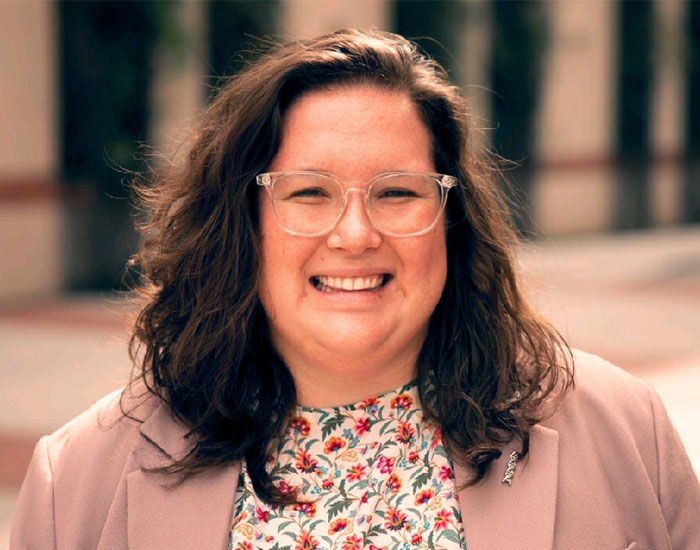Anna Capria, a student in Keck Graduate Institute (KGI)'s Master of Science in Human Genetics and Genomic Data Analytics (MSGDA) program, was recently selected as a 2023 Advocacy Certificate for Human Genetics and Genomics Trainee (ACGT). This prestigious program provides American Society of Human Genetics (ASHG) members pursuing a research or clinical career with an introduction to human genetics and genomics policy and advocacy while helping to build their professional skills.
Through bi-monthly virtual meetings held over the year, this select group of trainees will learn how to interact with leaders in genetics (including the CEO and past presidents of ASHG) and legislators and policymakers at the national level. Through real-world projects, they can enact meaningful change in funding, policy, and advocacy relating to genetics and genomics.
They will work directly with the ASHG and Lewisburg Associates, a consulting firm for national organizations like ASHG, universities, and non-profits.
This program reflects Capria's longstanding commitment to leadership, education, and resolving some ethical issues surrounding genetics. Specifically, she wants to ensure that people have the opportunity to be able to provide informed consent when it comes to accessing their genetic information.
With technological breakthroughs, whole genome sequencing (WGS)—essentially a precise DNA fingerprint—is more accessible than ever. The detailed data obtained from WGS provides the ability to rapidly identify the root cause of outbreaks on a mass scale and diseases on an individual scale, including some rare diseases that have eluded scientists for decades.
However, people must be adequately informed on the implications of receiving a WGS from their healthcare provider.
"Our baseline understanding of genetics as a population isn't complete enough at this point to be able to assume that someone walking into their doctor's office would understand immediately what a sequence is and what it means for their healthcare and their insurance," Capria, MSGDA '23, said.
Thus, she sees education as the key to transparency, privacy, and patient rights. This means educating the general public and providers, who may not have received much education—if any—on genomics in their medical training.
Trainees in the ACGT program will likely be interacting with the federal government on regulation policies.
"The FDA regulating genetic testing companies and companies collecting genetic data is definitely within their scope of coverage," Capria said.
Courses in KGI's MSGDA program have highlighted ethical issues in genetics and barriers to education, spurring her to start working toward solutions.
"I want it to be easier for people with any genetics questions to get clear, accurate answers," Capria said. "For example, if someone is working in cancer research and trying to sequence the tumors, how would they obtain that data in the first place—in the most efficient way—and how would they interpret it?"
Thankfully, institutions such as Boston Children's Hospital—where Capria is analyzing phenotypic information from the Children's Rare Disease Cohorts initiative as part of her KGI capstone project—are already taking steps. The hospital has a portal for physicians treating patients with genetic diseases where they can access information about the disease and treatment options.
"I think open tools like this are incredibly useful when building awareness and centralizing information," Capria said.
Currently, she is taking a course on scientific communication with KGI Professor Dr. Barbara Bailus , which has been particularly beneficial in furthering her goals surrounding education. In the class, they give presentations on genomics information aimed toward three audiences—those with an advanced science background, those with a general college education, and the general public. Capria shared,
"The class is teaching us essential skills when it comes to communicating information in an accessible way."
Rare disease advocacy is also vital for Capria, and to this end, she has been interacting with the National Organization for Rare Diseases advisory committees at the state level. Capria wants people to know that advocacy is essential and can be as simple as emailing your representatives.
"The most important thing for me is helping everybody learn a little bit more and improve," Capria said. "One important cause to support is increasing NIH funding for biomedical research, which helps fund life-saving genetics and genomics research."
You can fill out this short form urging Congress to support funding increases for NIH.
"I am so excited for Anna as she embarks on this advocacy certificate program," said MSGDA Program Director Dr. Barbara Fortini . "Her selection by the ASHG to be one of the students nationally recognized for genetics and genomics advocacy is a testament to her longstanding commitment to the ethical use of genetics and genomics in society."
